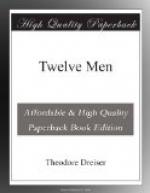“But,” I said, “if he told you you could stand it, you can, I’m sure. It’s not very likely he’d say you could if you couldn’t. He examined you, didn’t he? I don’t believe he’d deliberately put a strain on any one who couldn’t stand it.”
“Yes,” he admitted doubtfully, “that’s true perhaps.”
Still he continued to complain and complain and to grow more and more worried, until finally he slowed up and was lost in the background.
Reaching the gymnasium at the proper time I bathed and dressed myself quickly and waited on the balcony over the bathroom to see what would happen in this case. As a rule Culhane stood in or near the door at this time, having just returned from some route or “block” himself, to see how the others were faring. And he was there when the iron manufacturer came limping up, fifteen minutes late, one hand over his heart, the other to his mouth, and exclaiming as he drew near, “I do believe, Mr. Culhane, that I can’t stand this. I’m afraid there is something the matter with my heart. It’s fluttering so.”
“To hell with your heart! Didn’t I tell you there was nothing the matter with it? Get into the bath!”
The troubled manufacturer, overawed or reassured as the case might be, entered the bath and ten minutes later might have been seen entering the dining-room, as comfortable apparently as any one. Afterwards he confessed to me on one of our jogs that there was something about Culhane which gave him confidence and made him believe that there wasn’t anything wrong with his heart—which there wasn’t, I presume.
The intensely interesting thing about Culhane was this different, very original and forthright if at times brutal point of view. It was a blazing material world of which he was the center, the sun, and yet always I had the sense of very great life. With no knowledge of or interest in the superior mental sciences or arts or philosophies, still he seemed to suggest and even live them. He was in his way an exemplification of that ancient Greek regimen and stark thought which brought back the ten thousand from Cunaxa. He seemed even to suggest in his rough way historical perspective and balance. He knew men, and apparently he sensed how at best and at bottom life was to be lived, with not too much emotional or appetitive swaying in any one direction, and not too little either.
Yet in “trapseing” about this particular realm each day with ministers, lawyers, doctors, actors, manufacturers, papa’s or mamma’s young hopefuls and petted heirs, young scapegraces and so-called “society men” of the extreme “upper crust,” stuffed and plethoric with money and as innocent of sound knowledge or necessary energy in some instances as any one might well be, one could not help speculating as to how it was that such a man, as indifferent and all but discourteous as this one, could attract them (and so many) to him. They came from all parts of America—the




